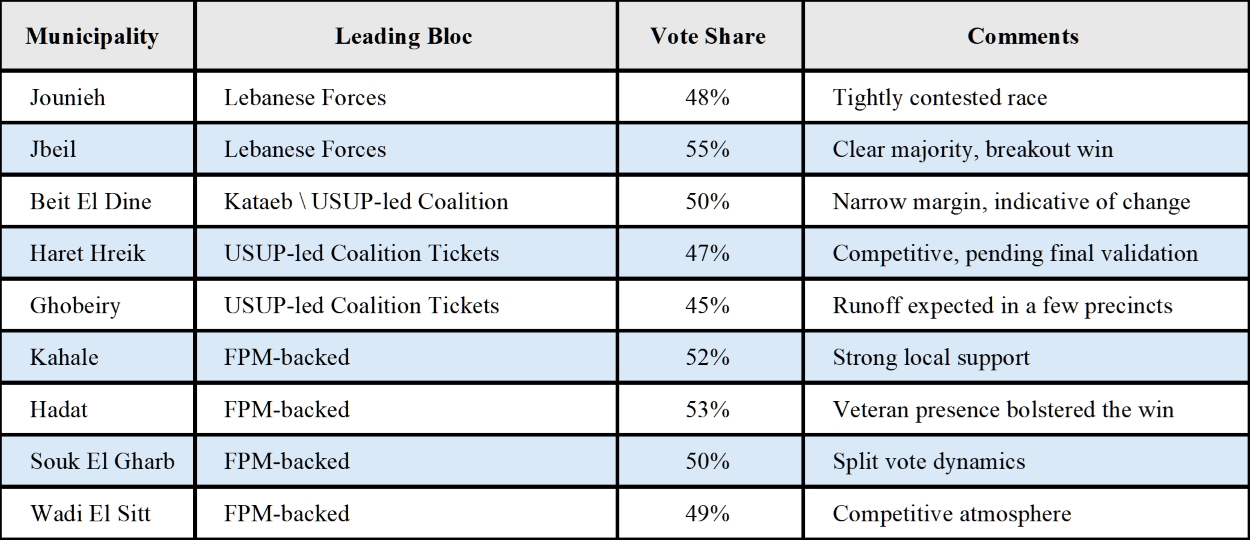Historic elections in Tur Levnon signal renewal of local governance and democratic reform in Lebanon
BAABDA, Lebanon — After nearly a decade of delays, Lebanon’s municipal elections finally took place, unfolding amid an atmosphere charged with anticipation and cautious hope. Voters in Tur Levnon (Mount Lebanon), a renowned Christian and Syriac Maronite stronghold, headed to the polls to redefine local governance. With voter turnout exceeding 45% in key municipalities, the election became a testament to renewed civic resolve and a growing demand for accountability in a country emerging from prolonged crisis.
Preliminary results painted a picture of both consolidation and change. In municipalities that anchor Tur Levnon’s heritage — cities such as Jounieh, Jbeil, Beit El Dine, and parts of the Metn district — the “Development and Loyalty” list achieved sweeping victories. In Jbeil, for example, Lebanese Forces-backed lists emerged triumphant, reflecting widespread voter support for reform and a departure from decades of stagnation. Across other regions, bloc-supported candidates secured significant wins, including in Baabda towns such as Haret Hreik and Ghobeiry. Meanwhile, Free Patriotic Movement (FPM)-backed lists maintained dominance in their strongholds, including Hadat, Souk El Gharb, Kahale, and Wadi El Sitt.
The results suggest that, despite occasional fragmentation, local alliances are beginning to coalesce around a renewed vision for Lebanon’s Christian electorate.
Political leaders wasted no time responding to the historic election results. Lebanese Forces leader Samir Geagea hailed the outcome as “a strong indication of the public’s determination to banish corruption and entrenched mismanagement.” With an air of measured optimism, Geagea emphasized that the shift occurring in key urban centers — where voters have grown weary of nepotism and inefficiency — marks a turning point for Lebanese politics. Similarly, Kataeb Party leader Samy Gemayel underscored that municipal elections are not merely a cause for celebration but a cornerstone in the restoration of democratic norms. “These contests at the local level are the bedrock upon which broader reform must be built,” he noted, signaling the need for continued electoral and institutional change.
In the uniquely charged context of Tur Levnon, the election served as more than an administrative exercise, it was a battle for identity. Ibrahim Mrad, head of the Universal Syriac Union Party (USUP), galvanized his supporters with fervor. In speeches delivered in neighborhoods steeped in historical significance, Mrad decried any concession of cherished Christian land to political actors perceived as threats, particularly where such deals could erode the community’s centuries-old legacy. “Our list stands for preserving our roots and securing our rightful place,” Mrad declared, framing the contest as both an electoral struggle and a cultural and historical imperative.
Amid intense partisan contests, the presence of state leadership provided a stabilizing counterbalance. President Joseph Aoun, a Syriac Maronite, inspected polling stations and monitored the computerized audit systems designed to ensure transparency. “The ballot box is more than a symbol, it is a vehicle for our collective renewal,” he remarked. His actions underscored the administration’s commitment to safeguarding the democratic process and reaffirmed the government’s pledge to uphold the rule of law as the nation embarks on this critical phase of local governance.
Adding another voice to the wave of optimism was veteran political figure Camille Shamoun. In measured and incisive remarks, Shamoun called on all political actors to recognize the transformative potential of the election results. Advocating for collaboration beyond partisan divides, he urged leaders to consolidate their gains and work together to ensure that Tur Levnon’s renewed mandate translates into improved service delivery and enhanced accountability at the municipal level. His comments resonated with voters who have long yearned for governance that blends tradition with modern efficiency.
The importance of the LF victory is not merely the cleaning of our administration from the residues of the collapsing Hezbollah regime. It is above all, the beginning of a new political vision based on the principles and values of subsidiarity. pic.twitter.com/qd3HqqgDUu
— ܬܐܘܕܪܘܣ ܒܪܝܘܠܝܘܣ ܐܠܟܣܢܕܪ Amine Bar-Julius Iskandar (@Amineiskandar2) May 5, 2025
Equally notable were the results achieved by the Free Patriotic Movement (FPM), articulated by MP Gebran Bassil during a press conference. Bassil highlighted that the FPM had fielded candidates across all six districts of Mount Lebanon. “Even in cities where we did not win, our goal was to affirm our presence,” he stated, underscoring the party’s long-term strategy of resilience and gradual influence rather than an expectation of immediate, sweeping victories. While the FPM did not secure a dominant majority in Tur Levnon, its sustained presence and strategic alliances have clearly positioned it as a key player in the region’s evolving political landscape.
As the final tallies are scrutinized, a nuanced rebalancing of power is emerging. Preliminary analysis indicates that the alliance between Lebanese Forces and Kataeb-backed lists has secured a majority in several critical municipalities, shifting the regional balance in favor of established Christian parties while leaving space for emerging voices. Observers suggest that local governance in Tur Levnon is likely to feature a blend of traditional caution and bold new initiatives — an outcome that may signal the beginning of a broader political realignment across Lebanon.
In Tur Levnon, where the deep-rooted traditions of the Syriac Maronite community intersect with a relentless drive for modern reform, these municipal elections represent more than a bureaucratic restructuring. They mark a turning point in Lebanon’s democratic journey. With a clear mandate for change and a renewed focus on local accountability, the region’s voters have delivered a resounding message: the time for reform is now, and preserving cultural identity must go hand in hand with democratic renewal.
As political leaders prepare to form new coalitions and set timetables for further reform, the eyes of Lebanon, and the international community, are fixed on Tur Levnon. The hope is that this crucible of transformation will serve as a model for local governance, reaffirming Lebanon’s rich traditions while paving the way for a stable and prosperous future.




















